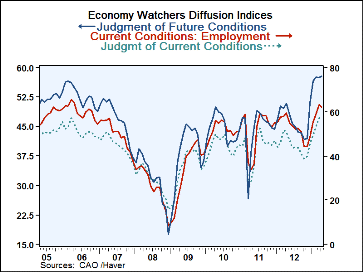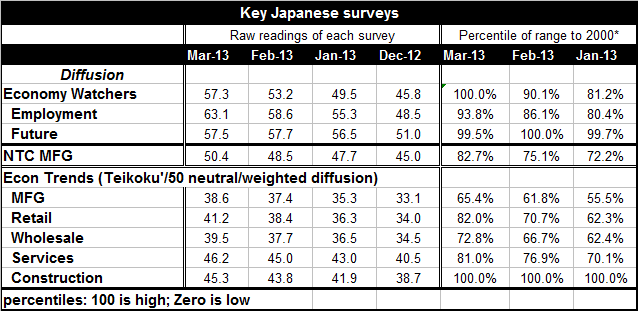 Global| May 10 2013
Global| May 10 2013Japan's Economy-Watcher's Index Rises
Summary
Japan's economy-watchers index moved up sharply in March to a level of 57.3 from 53.2. It has reached its highest mark since early 2000 when the index was launched. The rise in the economy-watchers index has been particularly sharp in [...]
 Japan's economy-watchers index moved up sharply in March to a level of 57.3 from 53.2. It has reached its highest mark since early 2000 when the index was launched. The rise in the economy-watchers index has been particularly sharp in recent months since Japan has pursued Abenomics and its weak yen policy. The employment metric also moved up, and sharply. In March it's up to 63.1 from 58.6. This index stands at the top 7% of its historic range of values. The future index backed off in March, falling to 57.5 from 57.7. However, this drop represents a drop from its historic high reading; the index continues to reflect a very strong outlook on the future.
Japan's economy-watchers index moved up sharply in March to a level of 57.3 from 53.2. It has reached its highest mark since early 2000 when the index was launched. The rise in the economy-watchers index has been particularly sharp in recent months since Japan has pursued Abenomics and its weak yen policy. The employment metric also moved up, and sharply. In March it's up to 63.1 from 58.6. This index stands at the top 7% of its historic range of values. The future index backed off in March, falling to 57.5 from 57.7. However, this drop represents a drop from its historic high reading; the index continues to reflect a very strong outlook on the future.
The economy-watchers index is marking its 11th strongest month-to-month gain in its entire history (156 observations) as of March. The employment component also has made a strong gain in March, the 16th largest gain in its history.
Japan's recovery from the financial crisis has been among one of the most uneven, globally for a number of reasons. Japan's vulnerability to the financial crisis was worsened by the ongoing overvaluation of the yen. After the crisis had passed its most severe stage, and the rest of the world was mounting a recovery, Japan was hit by natural disasters the form of earthquakes and a tidal wave. These events brought about a nuclear crisis which set Japan on an unplanned economic course, to close down its nuclear reactors which have been a very important source of energy in the Japanese economy. The switchover to conventional fossil fuels hit Japan's current account hard, turning it from its historic surplus into a string of deficits. In addition, conflicts with China over territoriality issues caused potential consumers in China for a while to boycott Japanese goods and led Japanese producers operating in China to halt production for a while. In addition some Japanese plants located in Thailand were affected by flooding; this also interrupted the Japanese supply train.
However, after putting this long list of extraordinary factors behind it and with a new prime minister in place, after period of having seen many changes in leadership, Mr. Abe has now appointed a new head of the central bank, and Japan's monetary policy has changed to become much more accommodative. The yen is finally beginning to move from its position of being highly overvalued back to a level that is more sensible. Japan's economy is responding.
With all these shocks behind it, the Japanese economy is finally doing better. However the G7 meets this weekend and there are concerns around the world about countries pursuing policies of competitive foreign exchange rate devaluations. In that respect we have to be concerned that at some point at least Japan is going to lose its "get out of jail free card" when it comes to letting its currency continue to weaken. Japan insists that such a topic is not on the G7 agenda this week. But, the weak yen certainly is an important ingredient in Japan's ongoing recovery and the yen will not be allowed to lose value indefinitely. I say this fully cognizant that the past teaches us that getting an exchange rate moving (the Plaza Accord) is much easier than stopping an exchange rate that is already in motion (the Louvre Accord).
Japan still has a long way up to go and still bears many burdens but its recent economic statistics continue to be positive. The economy-watchers index is in positive territory, has moved up sharply, and is very constructive. The outlook for Japan is better than it has been some time.

Robert Brusca
AuthorMore in Author Profile »Robert A. Brusca is Chief Economist of Fact and Opinion Economics, a consulting firm he founded in Manhattan. He has been an economist on Wall Street for over 25 years. He has visited central banking and large institutional clients in over 30 countries in his career as an economist. Mr. Brusca was a Divisional Research Chief at the Federal Reserve Bank of NY (Chief of the International Financial markets Division), a Fed Watcher at Irving Trust and Chief Economist at Nikko Securities International. He is widely quoted and appears in various media. Mr. Brusca holds an MA and Ph.D. in economics from Michigan State University and a BA in Economics from the University of Michigan. His research pursues his strong interests in non aligned policy economics as well as international economics. FAO Economics’ research targets investors to assist them in making better investment decisions in stocks, bonds and in a variety of international assets. The company does not manage money and has no conflicts in giving economic advice.






